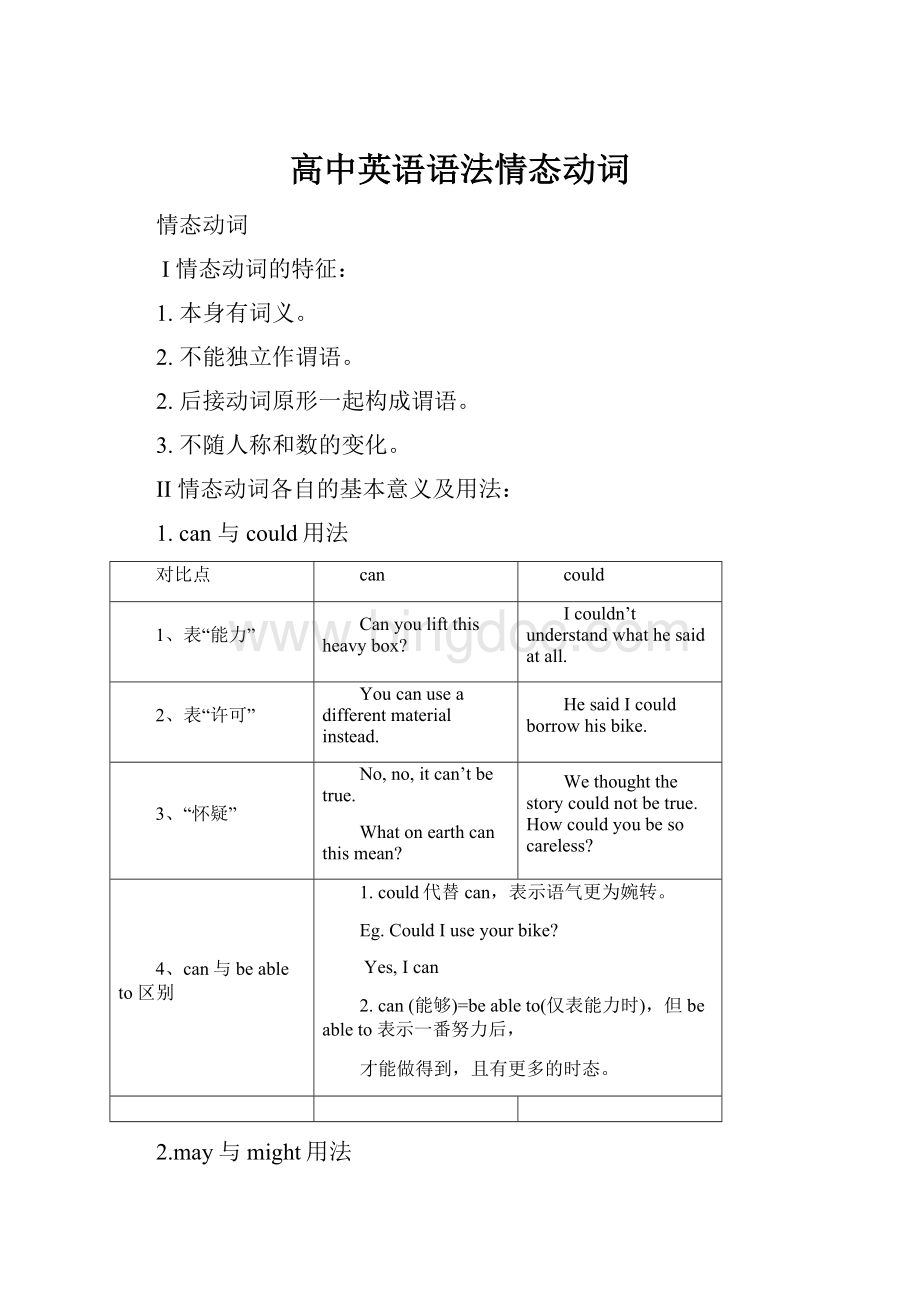高中英语语法情态动词.docx
《高中英语语法情态动词.docx》由会员分享,可在线阅读,更多相关《高中英语语法情态动词.docx(18页珍藏版)》请在冰点文库上搜索。

高中英语语法情态动词
情态动词
I情态动词的特征:
1.本身有词义。
2.不能独立作谓语。
2.后接动词原形一起构成谓语。
3.不随人称和数的变化。
II情态动词各自的基本意义及用法:
1.can与could用法
对比点
can
could
1、表“能力”
Canyouliftthisheavybox?
Icouldn’tunderstandwhathesaidatall.
2、表“许可”
Youcanuseadifferentmaterialinstead.
HesaidIcouldborrowhisbike.
3、“怀疑”
No,no,itcan’tbetrue.
Whatonearthcanthismean?
Wethoughtthestorycouldnotbetrue.Howcouldyoubesocareless?
4、can与beableto区别
1.could代替can,表示语气更为婉转。
Eg.CouldIuseyourbike?
Yes,Ican
2.can(能够)=beableto(仅表能力时),但beableto表示一番努力后,
才能做得到,且有更多的时态。
2.may与might用法
对比点
may
might
1.表“询问”
MayI…?
(=CanI…?
)
MightI…?
(=CouldI…?
)
(但比用may更客气)
2.表“允许”
Youmaytaketheboythere.
Hetoldmehemightcome.
(might与told相呼应)
3.表“可能”“或许”
Shemaynorlikethisplace.
I’mafraidhemightnotlikethisplay.
注:
1.MayI…?
的答语。
2.may可表示期望或祝愿
Mayyousucceed!
3.may(might)用于目的状语从句。
肯定:
Yes,youmay.
否定:
No,youmustn’t不行
(语气强硬)
No,youmaynot或No,you’dbetternot.
Theemperorgavethemsomegoldinorderthattheymightbegintheirworkatonce.
3.must与haveto用法
对比点
must
haveto
1.表“必须”
(主观看法)必须;没有过去式,可用于间接引语中。
HetoldmeImustdoaccordingtowhathesaid.
(客观需要)不得不,有多种时态。
It’srainingheavily,wecan’tgonow.
2.疑问句
MustI…?
Yes,youmust.(一定)
No,youneedn’t./youdon’thaveto.
(不必)
Doyouhavetogotoday?
Yes,wedo.
Youdon’thavetoworryaboutthat.
4.need与dare用法
对比点
need
dare
1.情态v.+动词原形
1)否定式
2)疑问式
Heneednot(needn’t)go.
---Needwedoitagain?
---No,youneedn’tdoitagain.
Hedarenotsayso.
Dareshegooutaloneatnight?
HowdareyousayI’munfair?
Ifhedaredothat,he’llbepunished.
Idaresay.(固定用法)
2.实义v.+todo1)肯定式
2)否定式
3)疑问式
Heneedstogo.
Hedoesn’t(doesnot)needtogo.
Doesheneedtodoitagain?
No,hedoesn’tneedotdoitagain.
Hedarestosay.
Hedoesnot(doesn’t)daretosay.
Ifyoudaretojumpintothewaterfromhere,sodareI.
3.didnotneedtodo表示过去没必要做
Shedidn’tneedtoattendthemeetingyesterday,andshestayedwithherchildren.(她没有参加)
5.should与oughtto用法
对比点
should
oughtto
1、表“应该”
表劝告、建议
Youshouldlistentothedoctor’sadvice.
WeshouldlearnfromZhangHua.
“有责任有必要”做某事
Yououghttofinishyourworkbeforeyougohome.
Weoughttohelpeachother.
2、表“估计”
Theyshouldgethomebynow.
“非常可能”的事,可译为“总应该”
Ifwestarttoworkrightnow,weoughttofinishitbeforelunch.
注:
1)should还可在虚拟语气中的使用
2)注意:
oughtto的疑问式及否定式
---Oughthetogo?
---Yes,Ithinkheoughtto.---No,heoughtn’tto.
否定式:
oughtn’ttodo(不说oughttonotdo)反疑问句:
oughtn’t______?
6.shall与will用法
shall
will
1.征询对方意见或请求指示,用于第一、三人称:
ShallI(we)…?
Shallhe(she)…?
WhereshallI(we)waitforyou?
1.询问对方的意思或向对方提出要求:
Willyou(please)…?
Won’tyou…?
Wouldyouliketo...?
(would替代will更客气)
Won’tyougoandseethefilm?
你不去看电影吗---Yes,IthinkIwill.不,我想去。
2.表示说话人的“意愿”有“命令”“警告”“强制”“允诺”“决心”等,用于第二、三人称。
YoushalldowhatItellyou(todo).
我叫你干什么你就干什么。
Everythingshallbedonetosavetheship.
一定要竭尽全力来拯救这艘船。
2.表示“意志”“意愿”,用于各种人称:
Iwon’tdoanythingyoudon’tlike.
我不会做任何你不喜欢的事。
Would表示过去时间的“意志”“意愿”
Shylockwouldnottakethemoneyearlier.
夏洛克先前是不肯要钱的。
7.usedto与would用法
usedto
would
1.表示过去的动作、状态,重在与现在情况的对比,不一定要有时间状语。
Iusedtoplaycardsalot,butnowIseldomplay.
Myhometownisnotwhatitusedtobe.
1.只表示过去动作的重复,有明确的时间状语。
IwouldgotoseemygrandfatheronSundaywhenhewasinthemiddleschool.
2.would后只接表动作的动词,不接表认识或状态动词
Heusedtobenervousintheexam.
2.表示过去的习惯有时可互换:
Whenwewereveryyoung,weusedto/wouldgoskatingeverywinter.
3.表示过去的次数时,不能使用:
(√)WewenttotheGreatWallfivetimeswhenwewereyoung.
(X)Weusedtogo/wouldgototheGreatWallfivetimeswhenwewereyoung.
注:
usedtodo的否定式:
usedn’ttodo或didn’tusetodo(usedn’t也可写作usen’t)
疑问式:
Didyouusetodo?
Didn’tyouusetodo?
Usedyoutodo?
Usedn’tyoutodo?
II情态动词表推测:
1.大多数情态动词(除表‘能力、许可、意志’外),都可以表示推测,其程度有差异。
按可能性程度的高低排列为:
must﹥will﹥would﹥oughtto﹥should
完全肯定完全可能很可能
﹥can﹥could﹥may﹥might
可能有可能
2.区分情态动词的否定含义:
maynot或许不、可能不mightnot可能不can’t不可能
mustn’t不许、禁止shouldn’t不应该needn’t不必
3.情态动词表推测具体运用:
情态动词可以对现在、进行、过去推测。
S主+情态动词+be+adj
对“性质”“特征”的推测
S主+情态动词+be+n
对“职业”“事物”的推测
S主+情态动词+动词原形
对经常性行为的推测
S主+情态动词+be+V-ing
对进行着的行为的推测
S主+情态动词+have+PP
对过去的行为的推测
情态动词表推测时:
1、can只能用于否定句和疑问句
2、must只能用于肯定句(它的否定句和疑问句其实就用can来代替了)
3、如句中有情态动词+完成时,定是对过去的推测。
4、句中如有表示不肯定的话语
E.gIamnotsure;Idon’tknow之类,常选may/might的各种形式。
4.表示反劝的特殊的表推测形式
1).could+have+P.P.
表示本来能做到,但事实上没有做到。
Hecouldhavefinishedthetaskontime,buttheheavysnowcame.
2).couldn’t+have+P.P.
表示本来不能做到,但已经做到了。
Shecouldnothavecoveredthewholedistance,butinfactshearrivedaheadoftime.
3)needn’t+have+P.P.
表示本不必做的,但已经做到了。
Sheneedn’thaveattendedthemeetingyesterday,butshedid.
4.)should/oughtto+have+P.P.
表示该做而没有做
Theplantisdead.Ishould/oughttohavegivenotmorewater.
5)shouldn’t/oughtn’tto+have+P.P.
表示不该做而做了。
Yououghtn’tto/shouldn’thavetakenherbikewithoutpermission.
5.注意:
must只能用于肯定句(它的否定句和疑问句其实就用can来代替了)
1.must+have+P.P.
表示对过去肯定的推测,“一定是,准是”
Theroadiswet.Itmusthaverainedyesterday.
2.can+have+P.P.
表示对过去的推测(限于问句中)
Canshehavesaidso?
他可能这样说吗?
3.can’t+have+P.P.
表示对过去的否定推测
Hecannothavesaidsuchafoolishthing.
III情态动词表推测的反意疑问句
1.情态动词表推测的反意疑问句,简单来说,就是以情态动词后的时态为淮,如句子里有明确的时间状语,则以其为准。
2.以must为例:
E.g.1.Youmustbehungrynow,aren’tyou?
2.HemustbewatchingTV,isn’the?
3Tommusthavelivedherforalongtime,hasn’the?
4.Shemusthavearrivedyesterday,didn’tshe?
注:
如选择题中(以Shemusthavearrivedyesterday,didn’tshe?
为例)既有didn’tshe又有hasn’tshe则以didn’tshe?
为最佳答案。
IV情态动词专项练习与解析一
()1.You_____returnthebooknow.Youcankeepittillnextweekifyoulike.
A.can’tB.mustn’tC.needn’tD.maynot
()2.Whereismypen?
I_____it.
A.mightloseB.wouldhavelostC.shouldhavelostD.musthavelost
()3.IwishI_____youyesterday.
A.seenB.didseeC.hadseenD.weretosee
()4.Ididn’thearthephone.I_____asleep.
A.mustbeB.musthavebeenC.shouldbeD.shouldhavebeen
()5.Ifmylawyer_____herelastSaturday,he_____mefromgoing.
A.hadbeen;wouldhavepreventedB.hadbeen;wouldprevent
C.were;wouldpreventD.were;wouldhaveprevented
()6.He_____youmorehelp,eventhoughhewasverybusy.
A.mighthavegivenB.mighthaveC.mayhavegivenD.maygive
()7.Ifit_____forthesnow,we_____themountainyesterday.
A.werenot;couldhaveclimbedB.werenot;couldclimb
C.hadnotbeen;couldhaveclimbedD.hadnotbeen;couldclimb
()8.Withoutelectricityhumanlife_____quitedifficulttoday.
A.isB.willbeC.wouldhavebeenD.wouldbe
()9.Acomputer_____thinkforitself,itmustbetoldwhattodo.
A.can’tB.couldn’tC.maynotD.mightnot
()10.Jenny_____havekeptherword.Iwonderwhyshechangedhermind.
A.mustB.shouldC.needD.would
()11.We_____lastnight,butwewenttotheconcertinstead.
A.musthavestudiedB.mightstudy
C.shouldhavestudiedD.wouldstudy
()12.—CouldIborrowyourdictionary?
—Yes,ofcourseyou_____.
A.mightB.willC.canD.should
()13.Tomoughtnotto_____meyoursecret,buthemeantnoharm.
A.havetoldB.tellC.betellingD.havingtold
()14.—Ifhe_____,he_____thatfood.
—Luckilyhewassenttothehospitalimmediately.
A.waswarned;wouldnottakeB.hadbeenwarned;wouldnothavetaken
C.wouldbewarned;hadnottakenD.wouldhavebeenwarned;hadnottaken
()15.Peter_____comewithustonight,butheisn’tverysureyet.
A.mustB.mayC.canD.will
()16.ItoldSallyhowtogethere,butperhapsI_____forher.
A.hadtowriteitoutB.musthavewrittenitout
C.shouldhavewrittenitoutD.oughttowriteitout
()17.Ididn’tseeyoursisteratthemeeting.Ifshe_____,shewouldhavemetmybrother.
A.hascomeB.didcomeC.cameD.hadcome
()18.—ShallItellJohnaboutit?
—No,you_____.I’vetoldhimalready.
A.needn’tB.wouldn’tC.mustn’tD.shouldn’t
()19.Whenapencilispartlyinaglassofwater,itlooksasifit_____.
A.breaksB.hasbrokenC.werebrokenD.hadbeenbroken
()20.It’snearlyseveno’clock.Jack_____behereatanymoment.
A.mustB.needC.shouldD.can
()21.—Therewerealreadyfivepeopleinthecarbuttheymanagedtotakemeaswell.
—It_____acomfortablejourney.
A.can’tbeB.shouldn’tbeC.mustn’thavebeenD.couldn’thavebeen
()22.Johnny,you_____playwiththeknife,you_____hurtyourself.
A.won’t;can’tB.mustn’t;mayC.shouldn’t;mustD.can’t;shouldn’t
()23.Thefirespreadthroughthehotelveryquicklybuteveryone_____getout.
A.hadtoB.wouldC.couldD.wasableto
()24.—WhencanIcomeforthephotos?
Ineedthemtomorrowafternoon.
—They_____bereadyby12:
00.
A.canB.shouldC.mightD.need
()25.—IstayedatahotelwhileinNewYork.
—Oh,didyou?
You_____withBarbara.
A.couldhavestayedB.couldstayC.wouldstayD.musthavestayed
()26.—Willyoustayforlunch?
—Sorry,_____.Mybrotheriscomingtoseeme.
A.Imustn’tB.Ican’tC.Ineedn’tD.Iwon’t
()27.—AreyoucomingtoJeff’sparty?
—I’mnotsure.I_____gototheconcertinstead.
A.mustB.wouldC.shouldD.might
()28.—Writetomewhenyougethome.
—_____.
A.ImustB.IshouldC.IwillD.Ican
()29.Iwasreallyanxiousaboutyou,you_____homewithoutaword.
A.mustn’tleaveB.s